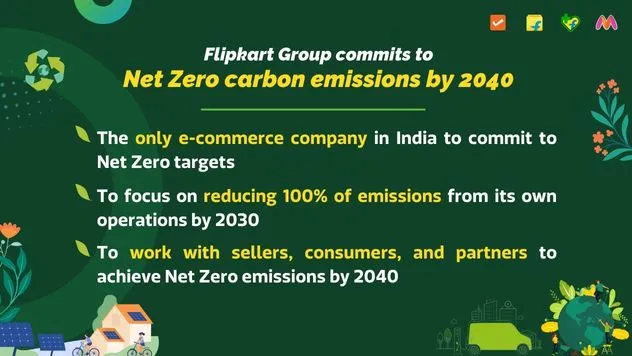
Flipkart Group targets net-zero carbon emissions by 2040
It is the only Indian e-commerce firm to commit to net-zero emissions.
Indian e-commerce firm Flipkart Group committed to decarbonising its operations by 2030, and its larger value chain by 2040, in line with the 2015 Paris Agreement to keep the rise of global temperature to below 1.5 degrees Celcius.
In a statement, it said it is the only Indian e-commerce company to have committed to the environmental goal. To push through with the 2030 commitment, Flipkart is going to increase energy efficiency at its corporate office, supply chain facilities, and source power from renewable sources like solar.
It will also work with its sellers, consumers, and partners to achieve the 2040 net-zero emissions as the majority of its climate impact comes from its extended value chain which includes transportation and logistics, amongst others.
“As part of our Net Zero efforts, our sustainability initiatives will include the larger ecosystem, comprising our sellers, customers, and brands, to bring about an industry-wide shift. We recognise the importance of working collaboratively to reduce climate impact and will continue to steer our efforts towards this commitment and to decarbonise the e-commerce value chain.” Flipkart CEO Kalyan Krishnamurthy said.
READ MORE: India needs up to $250b investment to reach 2030 RE goals: Moody’s
The company is focusing on key areas to reduce carbon footprint, which include having a sustainable platform that will drive consumer awareness and initiatives to support sustainable products and creating circular business models.
Flipkart plans to have a responsible value chain through the electrification of logistics, incorporating renewable energy, environment-friendly packaging, waste management initiatives, responsible sourcing in business practices, establishing green infrastructure, as well as supplier engagement and seller education.
It also plans to form partnerships with other industries to develop solutions to create a sustainable e-commerce model.
Some of its moves aligned with the commitment include Flipkart’s partnership with the Climate Group’s EV100 initiative to deploy 25,000 electric vehicles in the country by 2030, and not-for-profit environment organisation Canopy for responsible sourcing of sustainable packaging and man-made cellulosic fibres to offer sustainable products.
Flipkart also works with more than 250 ecosystem partners, including EV suppliers, manufacturers, and brands across India.



















 Advertise
Advertise







